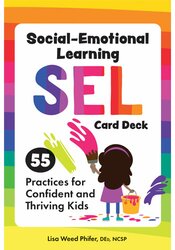Ask a Therapist: How Do I Teach My Child Social-Emotional Skills?
3 proven strategies for SEL development

My son’s kindergarten teacher said we should be working on his social-emotional skills this summer. What exactly does that mean and where do I start?
– Proactive yet Puzzled Parent
Dear Proactive,
Social-emotional learning (SEL) is the foundation for children to gain a wide range of skills and behaviors that will provide success in life.
There are five key elements to SEL: self-management, thinking about others, self-awareness, relationship skills, and responsible thinking. And summer is filled with opportunities to learn and practice social-emotional skills! Identifying feelings, waiting in line, playing with friends, or adjusting to new routines are all great starting points for strengthening your child’s SEL skills. These skills will help them in school in the fall, and even better, they continue to develop across your child’s lifetime, so engaging in SEL activities benefits the whole family.
For younger kids, adults and older siblings can help explicitly point out skills—for instance, waiting their turn, asking for help, or brainstorming solutions to a problem. Kids also learn by watching, so older family members can serve as positive models of SEL in action.
Here are a few fun and easy activities to try this summer!
There are many ways to express how we are feeling, but this can be challenging for younger kids just learning to identify feelings. Behaviors can stem from frustration when your child is not aware of what and why they are feeling a certain way.
Now that your child has a bank of feeling words, how do they handle these feelings? There are many ways to express feelings, some with good outcomes—and others, not so much. Explore ways to handle everyday feelings like excitement, boredom, or disappointment.
Create a “Feelings Menu” where the entire family works together to list ways to cope or manage different types of feelings in a healthy way. For a “Bored Menu,” ideas might include:
When you notice your child identifying a feeling, showing feelings, or expressing a feeling, reinforce it! Tell them what you notice and cheer them on! You can also continue practicing SEL skills with your child at any time with my latest card deck, SEL Card Deck: 55 Practices for Confident and Thinking Kids! The summer goes by quickly! Make the most of it!
- Lisa Weed Phifer, D.Ed., NCSP
– Proactive yet Puzzled Parent
Social-emotional learning (SEL) is the foundation for children to gain a wide range of skills and behaviors that will provide success in life.
There are five key elements to SEL: self-management, thinking about others, self-awareness, relationship skills, and responsible thinking. And summer is filled with opportunities to learn and practice social-emotional skills! Identifying feelings, waiting in line, playing with friends, or adjusting to new routines are all great starting points for strengthening your child’s SEL skills. These skills will help them in school in the fall, and even better, they continue to develop across your child’s lifetime, so engaging in SEL activities benefits the whole family.
For younger kids, adults and older siblings can help explicitly point out skills—for instance, waiting their turn, asking for help, or brainstorming solutions to a problem. Kids also learn by watching, so older family members can serve as positive models of SEL in action.
Here are a few fun and easy activities to try this summer!
1. Build communication skills by learning new feeling words.
There are many ways to express how we are feeling, but this can be challenging for younger kids just learning to identify feelings. Behaviors can stem from frustration when your child is not aware of what and why they are feeling a certain way.
- Make funny faces at each other. Take turns showing feelings with your mouth, eyes, eyebrows, and body. Point out subtle differences in how your face and muscles feel with each change.
- Create a feelings list. Share words with your child beyond the basics: happy, sad, and mad. For example, take a feeling like happy and expand it—move from happy to excited to overjoyed! Write these words down and have your child color-code them to connect them back to base feelings. (For example, they may color all the words that expand from happy in varying shades of greens. Words that stem from angry might be different shades of red.)
2. Recognize feelings in others.
Keep the feelings list going all summer long! What feeling words can you and your child discover in books or movies? What about in the conversations they have with friends or family?- Go on a feelings scavenger hunt. Sort through a stack of books and be on the lookout for feeling words.
- Have the whole family read a book or watch a movie together. Have your child pay attention to how the characters feel throughout. How does the character’s feelings change? What might happen next?
3. Take these feelings and learn to express them.
Now that your child has a bank of feeling words, how do they handle these feelings? There are many ways to express feelings, some with good outcomes—and others, not so much. Explore ways to handle everyday feelings like excitement, boredom, or disappointment.
Create a “Feelings Menu” where the entire family works together to list ways to cope or manage different types of feelings in a healthy way. For a “Bored Menu,” ideas might include:
- Organizing toys or books by color or function
- Riding a bike
- Being creative—drawing, writing, painting, dancing
- Connecting with friends or family
- Exploring the outdoors (with permission of course!)
- Trying something new! (i.e., a board or card game, craft, or a family meal)
When you notice your child identifying a feeling, showing feelings, or expressing a feeling, reinforce it! Tell them what you notice and cheer them on! You can also continue practicing SEL skills with your child at any time with my latest card deck, SEL Card Deck: 55 Practices for Confident and Thinking Kids! The summer goes by quickly! Make the most of it!
- Lisa Weed Phifer, D.Ed., NCSP
Discover 55 Practices for Confident and Thriving Kids

Designed for kids 8-12, the Social Emotional Learning (SEL) Card Deck provides teachers, parents, and therapists with 55 engaging and fun activities that teach the five key elements of SEL:
- Self-management: Handling emotions in healthy ways
- Thinking about others: Building empathy and understanding of others
- Self-awareness: Identifying emotions, thoughts, and values important to you
- Relationship skills: Working together to solve problems
- Responsible thinking: Using tools to guide decision-making
Meet the Expert:
Lisa Weed Phifer, DEd, NCSP, is a nationally-certified school psychologist, certified Autism Spectrum Disorder Clinical Specialist, and author who has a well-established career supporting school-based mental health and social emotional learning for children and adolescents. Phifer's work has focused on integrating cognitive-based therapy (CBT) and core social emotional competencies into practical, child-focused activities. She has presented across the U.S. and internationally to educators, clinicians, and parents, on topics of CBT, trauma-informed practices, and social emotional learning. She is the lead author of the CBT Toolbox for Children & Adolescents (PESI, 2017), Parenting Toolbox (PESI, 2018) and the Trauma-Informed Social Emotional Toolbox for Children & Adolescents (PESI, 2020). Additionally, she is published in the School Mental Health Journal and contributed to both editions of Supporting and Educating Traumatized Children (Rossen, 2020).
Learn more about their educational products, including upcoming live seminars, by clicking here.
Learn more about their educational products, including upcoming live seminars, by clicking here.
Topic: Families and Couples | Children & Adolescents | Educators | Classroom Resources
Tags: Activity | How To | Success | Strategies | Children



